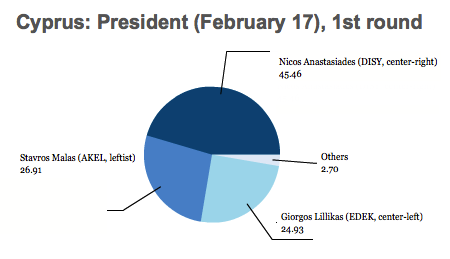
Center-right presidential candidate Nicos Anastasiades (pictured above) overwhelmingly triumphed in Sunday’s presidential election in Cyprus, outpacing his nearest rivals by nearly 20%. Nonetheless, he fell about 4.5% short of the 50% absolutely majority he would have needed to win the election outright and avoiding a runoff that will now take place next Sunday on February 24, despite early exit polls that showed he might win up to 52% of the first-round vote. 
Anastasiades, the candidate of the center-right Democratic Rally (DISY, Δημοκρατικός Συναγερμός or Dimokratikós Sinayermós), will face health minister Stavros Malas, the candidate of the governing, leftist Progressive Party of Working People (AKEL, Aνορθωτικό Κόμμα Εργαζόμενου Λαού or Anorthotikó Kómma Ergazómenou Laoú), who edged out alternative leftist candidate Giorgos Lillikas:
 So the question now is whether Lillikas’s voters will move en masse to Malas in the runoff or, alternatively, they will split between Anastasiades and Malas, thereby giving the center-right candidate sufficient support to win the presidency next week.
So the question now is whether Lillikas’s voters will move en masse to Malas in the runoff or, alternatively, they will split between Anastasiades and Malas, thereby giving the center-right candidate sufficient support to win the presidency next week.
Anastasiades has pledged to move forward as quickly as possible to secure a €17 billion bailout that Cyprus needs to avoid sovereign default in a country that’s seen its public debt rise to 140% of GDP. Although talks have been ongoing for over a year with the far leftist administration of outgoing president Demetris Christofias, the current administration has not been willing to implement the privatization of state industries that European leaders would require, though it has implemented tax increases and budget cuts over the past year. Those austerity measures have worn down the popularity of Christofias and of his party’s presidential candidate, Malas.
At first glance, an alliance between Lillikas and Malas makes sense — both are generally to the left of Anastasiades, and Lillikas has campaigned on a platform of refusing to lead Cyprus into a bailout with tough conditions, arguing instead that Cyprus should rely on recently discovered offshore natural gas deposits to boost its public finances. Lillikas, a businessman and an independent candidate, was supported by several small centrist and leftist parties, including the center-left Movement for Social Democracy (EDEK, Κινήμα Σοσιαλδημοκρατών or Kinima Sosialdimokraton).
Taken together, Lillikas and Malas polled nearly 6% more than Anastasiades in the first round, meaning that a majority of Cypriots appear to oppose the more austerity-focused bailout approach Anastasiades is very likely to pursue if elected. But in order to upset Anastasiades in the runoff, Malas would have to sweep up over 93% of Lillikas’s first-round voters. That seems unlikely, especially given that supporters of many of Cyprus’s political parties were split in the first round between Lillikas and Anastasiades, including the smaller Evroko (European Party) and Cyprus’s Ecological and Environmental Movement, both of which ultimately deadlocked over the issue of endorsing either Lillikas or Anastasiades.
But that’s especially true of Cyprus’s Democratic Party (DIKO, Δημοκρατικό Κόμμα or Dimokratikó Kómma), a centrist party that most recently held the presidency under Tassos Papadopoulos from 2003 to 2008, under whom Lillikas served as foreign minister from 2006 to 2007.
Although DIKO ultimately endorsed Anastasiades in the first round, many rank-and-file DIKO voters supported Lillikas, and that means it’s likely those voters will turn to Anastasiades in the runoff or, at least, abstain entirely from voting or protest-vote for neither Anastasiades nor Malas.
Once derided as ‘Nasty Nic’ for his reputation as a mean-streaked and hot-tempered politician, Anastasiades’s victory today marks a remarkable comeback since he fell from favor nearly a decade ago after supporting the ‘Annan Plan’ that would have reunited the Greek and Turkish sides of the divided island of Cyprus — over 76% of Greek Cypriot voters opposed the plan in a 2004 referendum, despite Turkish Cypriot backing for the plan. The island remains split between the (largely Greek Cypriot) Republic of Cyprus and the (largely Turkish Cypriot) Turkish Republic of Northern Cyprus, following a 1974 Cypriot coup that led to an attempt by Greece to annex the entire island and a subsequent Turkish invasion of the north.
Although the Turkish/Greek issue has not been a significant issue during the campaign, if he’s elected as president next Sunday, Anastasiades may well find himself on the wrong end of Cypriot public opinion once again, given that he’s indicated he’s willing to make tough sacrifices in order to secure a bailout for Cyprus. European leaders, including German chancellor Angela Merkel, have expressed support for Anastasiades, and it seems much likelier that Anastasiades could achieve a bailout deal for Cyprus.
Merkel and other European leaders would be likely to demand extremely onerous concessions though, certainly no less than the concessions imposed on Greece. In light of the Cypriot banking sector’s less-than-pristine reputation on money laundering, it’s expected that a bailout would benefit dodgy Russian financiers and oligarchs whose money is currently deposited in Cyprus’s banks — a proposition that Merkel will likely find politically difficult with seven months to go until her own reelection campaign in Germany.
![]()


